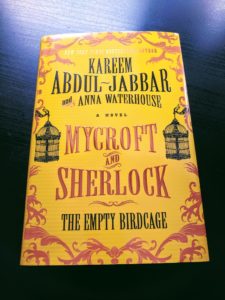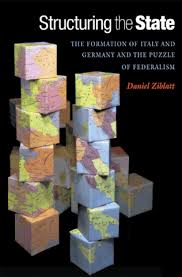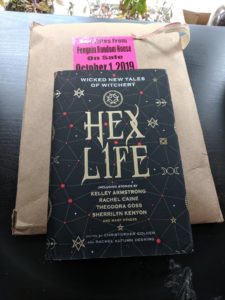Q: Every book has its own story about how it came to be conceived and written as it did. How did Wonderland evolve?
Marie: Our editor at Titan, Cat Camacho, had quite a large part to play with this one. We were pitching various projects, one of which was an anthology of dark fairy tales – Cursed, due out in March next year – and Cat said they’d like to see an anthology of stories based around the world of Alice. Not surprisingly, we leapt at the chance to edit that one – it’s been a lot of fun. Once we had the go-ahead, we started contacting authors we thought would love the idea as much as we did, and we went from there – we’ve been very lucky to have some wonderful authors on board, and they’ve all written stories we love.
Q. Did you curate this anthology with any particular audience in mind? Are there any particular audiences you hope will connect with this book?
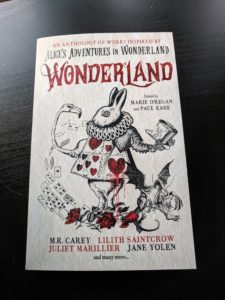 Paul: I think first and foremost we had Alice fans in mind when we set out to put this book together, but also wanted the anthology to be accessible to people who weren’t that familiar with the tales. Both of us are into the darker side of fiction as well, so that probably played a part when approaching authors and talking to them about our intentions. But really we wanted to keep it as open as possible and hope that in the range of tales we got back there would be something for absolutely every reader. Judging from the response to the book we’ve had so far, we seem to have achieved that for the most part. One reviewer even commented recently ‘There’s something for everyone’, so job done, I hope.
Paul: I think first and foremost we had Alice fans in mind when we set out to put this book together, but also wanted the anthology to be accessible to people who weren’t that familiar with the tales. Both of us are into the darker side of fiction as well, so that probably played a part when approaching authors and talking to them about our intentions. But really we wanted to keep it as open as possible and hope that in the range of tales we got back there would be something for absolutely every reader. Judging from the response to the book we’ve had so far, we seem to have achieved that for the most part. One reviewer even commented recently ‘There’s something for everyone’, so job done, I hope.
Marie: As Paul says, the first and most obvious audience is readers who loved Alice in Wonderland and Through the Looking Glass – but more than that, we wanted an anthology of stories that would hopefully draw new readers into that world; if they like Wonderland, we hope they’ll seek out the originals – and some of the other Alice-inspired fiction that’s out there. We’re both known for loving – and writing and editing – darker fiction, so I think that’s possibly informed our sensibilities on this project as well as filtering through to the authors. We have what we wanted, though, a very broad range of stories so that anyone picking the book up should, we hope, find something in there to love.
Q. Wonderland covers such a broad spectrum of speculative fiction, with excellent works from really talented authors. Were there any authors you were sad not to have been able to include in this collection?
Paul: There are always going to be writers you wish you had space to include, or that they had time to contribute something to the line-up. Two that spring to mind are Neil Gaiman and Christina Henry, who for different reasons couldn’t be involved – but we did manage to get them into our next one for Titan which comes out in March next year, Cursed. But, as you say, the list of hugely talented authors in Wonderland is so terrific that we have no complaints whatsoever. They’ve made it the book it is, which we think is very special indeed and hope that readers agree.
Marie: That’s always the case – no matter how big an anthology is, there’s always someone you’d love to have included but either there’s no more room, or they haven’t got time, or don’t feel they’re right for a particular project… as Paul’s mentioned already, we did ask Neil Gaiman and Christina Henry to take part but they couldn’t this time around – they will be in Cursed, though, and we couldn’t be happier.
Q. I know you’re not supposed to have favorites, but if you could only pick one work to recommend from
Wonderland, which would it be?
Paul: They’re all so fantastic that it would be hard to single any out. What’s so lovely is that the range of different topics, the styles and tones, are so different that no two stories are alike – which also means you can’t really compare them to each other either. All I’ll say is that they’re of such a high quality that it
makes me proud to have been able to read, work on, and include them in this anthology. Marie: I can’t do that, sorry – we’re very happy with all the stories we received, and they’re all very different from each other, I wouldn’t like to single one out over the others.
Q. Apart from Wonderland itself, what has been your favorite work in the setting, whether it be in print or other media?
Paul: You mean in the Wonderland universe, and apart from the original tales – which had quite a big impact on both of us growing up? The Disney adaptation is the one that comes to mind straight away, which I saw before reading the original books. Even at a really young age, that appealed to my love of the surreal and the bizarre. But I’ve also mentioned this one before in interviews, there was a great adaptation from 1999 starring Whoopi Goldberg, Ben Kingsley, Robbie Coltrane and Gene Wilder to name but a few, with Tina Majorino as Alice. That one stands out for me amongst the live action versions.
Marie: I think my favourite was set by the first thing that introduced me to Alice, and that was the Disney movie – I read and loved the books after that, but the Disney remains my first love when it comes to Alice.
Q. What were the first books you read that made you think, “I have got to create something like this someday!”
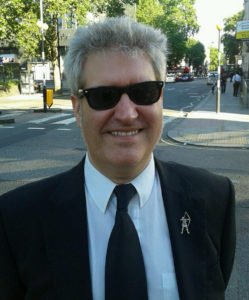
Paul Kane
Paul: In general? My grandad used to read me a story by Enid Blyton when I was little called ‘The House in the Fog’, where this boy gets lost in a strange mist and finds a weird house. He takes shelter inside and lots of fantastical things happen to him, but when he returns after the fog has gone the house isn’t there. I used to get him to read that to me time and time again; that really sparked my imagination. When I was old enough to read, I devoured anything that was SF, Fantasy, Horror or Crime, but the books that really made me want to be a writer were Clive Barker’s Books of Blood – and of course his subsequent novels after that. Anyone who knows me, knows about my lifelong love of his work. It just blew me away, from the ideas to the style of
writing. I’m lucky enough to have worked in Clive’s universes myself and count him as a friend all these years later.
Marie: I grew up on Enid Blyton, then when I was around seven I started on Agatha Christie and loved those – then when I was nine I found an anthology called Thin Air in the school library, and took it out every week for two years until they gave it to me; so I guess it was that. It was a huge anthology of classic horror stories, like W.W. Jacobs’ ‘The Monkey’s Paw’, Charlotte Gilmore Perkins’ ‘The Yellow Wallpaper’, M.R. James’ ‘The Ash Tree’… loads of them. Then a little later I discovered Stephen King and was lost forever.
Q. You’re both accomplished authors. What made you decide to go the compendium-editing route, and how was that transition for you?
Paul: I’ve been editing almost as long as I’ve been writing professionally, going back to the ’90s. I was editing back then for the small presses, and when I got to know Marie she asked if I’d like to come on board at the British Fantasy Society as Special Publications Editor, putting out books featuring the likes of Ramsey Campbell, Rob Holdstock, Kim Newman and Muriel Gray. That was a fantastic training ground for me, and a few years later we began editing anthologies together mass market beginning with Hellbound Hearts for Simon & Schuster – stories based around the Hellraiser mythos – and continuing on with books like A Carnivale of Horror (PS), The Mammoth Book of Body Horror (Constable & Robinson/Running Press) and the current books for Titan like Exit Wounds and Wonderland. So really it wasn’t a case of transition, because I’ve been doing it for so long anyway. I used to teach creative writing as well, so I think that helps – it’s a similar process to marking fiction, editing it. But of course you’re always editing your own work too, or should be. It’s all connected. I love that feeling of being the first person to read something new from a favourite writer. It really gives me a buzz.
Marie: I first got brought into the British Fantasy Society by Gary Couzens, who asked me if I’d like to edit their newsletter, Prism. From there I moved on to editing their fiction magazine, Dark Horizons, and eventually co-edited an anthology for the BFS with Paul – BFS: A Celebration. I’ve always loved reading short fiction, and editing magazines eased me into the idea of editing anthologies – I’ve done quite a few with Paul now, plus two of my own – The Mammoth Book of Ghost Stories by Women and Phantoms – and I’ve also recently co-edited one for charity with New Zealand author and editor Lee Murray – Trickster’s Treats #7, for Things in the Well. I love that feeling when you get an idea for a project, and start thinking how to put it together, who’d be great to write a story for it… and it’s a wonderful feeling to see the finished project.
Q. Do you find yourselves gravitating towards certain editing tasks such that each of you ends up having a particular role in bringing a book to fruition, or do you both cover a little bit of everything?
Paul: We both cover a bit of everything. When a story comes in, we’ll format it and then both of us will go through it. Then when everything is in we’ll talk about where to place the stories in the book, before compiling everything and going through it as a whole, and even talking about covers. We’re really lucky in that we work well together, we’re quite in tune. As a married couple you’d certainly hope so!
Marie: We both cover everything; we both go over the stories at every stage of the project, and both decide things like story order, covers, everything really. We work very well together on the editing side of things – we do with most things, really.
Q. What made you choose horror and dark fantasy as your primary means of expression?
Paul: For me personally, I’ve always been drawn to the darker side of fiction – whether it’s reading or writing it. Not sure why that is, maybe it reflects the kind of world we live in – or is a means to have some kind of ‘control’ over the bad things that happen in it, to escape a – sometimes – much darker reality for a while. Speculative fiction has always been very good at commenting on what’s happening around us, so I like that about it. But also the best drama comes from conflict and struggle, and nowhere do you see this more than in horror and dark fantasy. It’s fiction you can really get your teeth into, reading or writing-wise.
Marie: As I said earlier, it hooked me from a very early age – to quote the master, Stephen King, it’s what sticks in the drain. By which I mean – it’s what speaks to me, what holds my interest and sparks my imagination in a way no other fiction form has ever done. I love reading across many genres, my favourites are horror and crime, and those are the two I write in predominantly – at least so far.
Q. What can you tell us about your next project?
Paul: Together, that would be editing Cursed for Titan, but I’m not sure how much we’re allowed to say at this point. It obviously focuses on curses, with different spins on the fairytale and other mythologies, both modern and traditional. Writing-wise for me, I’ve just signed a three-book deal with HQ Digital/HarperCollins to deliver a set of psychological/domestic noir thrillers as PL Kane. The first of those will be out in January 2020, Her Last Secret, and is available to pre-order here po.st/herlastsecret
Marie: Cursed is the next anthology, as Paul’s said, writing-wise I have a collection of psychological horror short stories due out next spring from Black Shuck Books, and there are a few projects that are at varying stages of completion, so hopefully more on those next year.
Q. What are you reading at the moment?
Paul: I’m reading Nothing to Hide by James Oswald, the second in his Constance Fairchild series which came out the other month. I’m a huge fan of James’ work, especially his Inspector McLean books; they blend horror and crime perfectly, and that ticks a lot of my boxes.
Marie: I’m reading The Reddening, Adam L.G. Nevill’s latest supernatural novel, due out next month – I’m a big fan of Adam’s writing, and am thoroughly enjoying this one.
Q. Are there any new books or authors in speculative fiction that have you excited?
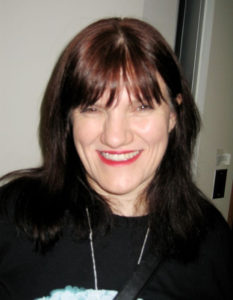
Marie O’Regan
Paul: Again, it’s difficult to single some people out over others – there’s a lot to get excited about in the genre at the moment. But for me, personally, I’m looking forward to Ghoster by Jason Arnopp, because I thought his previous novel The Last Days of Jack Sparks was amazing. Very much looking forward to the next novel by Paul Tremblay as well, as The Cabin at the End of the World was one of the best things I’ve ever read – I’m still chewing over some of the stuff in there, which is always a good thing. I think Laura Mauro – who, coincidentally, is in Wonderland – is an author to keep an eye on. She has a new collection out at the moment Sing Your Sadness Deep from Undertow Publications, and I hear she’s going to turn her hand to a novel in the near future so I’m very much looking forward to reading that.
Marie: There are quite a few names to get excited about in speculative fiction at the moment – like Paul, I’m looking forward to Jason Arnopp’s Ghoster and anything by Paul Tremblay. I’m a big fan of Josh Malerman, too, so very much looking forward to seeing what he comes up with next – his work is so varied, and always a pleasure to read. Sarah Lotz is another author whose work I love, then there’s Michelle Paver, Catriona Ward, Laura Purcell… so many wonderful writers.
Q. Tell us why you love Wonderland!
Paul: As a place? Well, it’s just barking mad isn’t it. I absolutely love that! I’ve always been attracted to the surreal and weird – my favourite painters are Magritte and Dali, my favourite comedy show is Python… so you get the drift. Wonderland is the epitome of that in a fantasy setting, with horror elements. It really doesn’t get any better than that as far as I’m concerned.
Marie: Because there are no limits to what you might find there – it’s a place without obvious rules, where the limits of your imagination are the only boundaries you’ll find… it’s a place where, quite simply, anything could happen – and probably will.
~~~
Author Links:
Marie O’Regan
Paul Kane
~~~
Wonderland was published September 17th 2019 and is available via all good book sellers. My review of the book itself may be found here.

